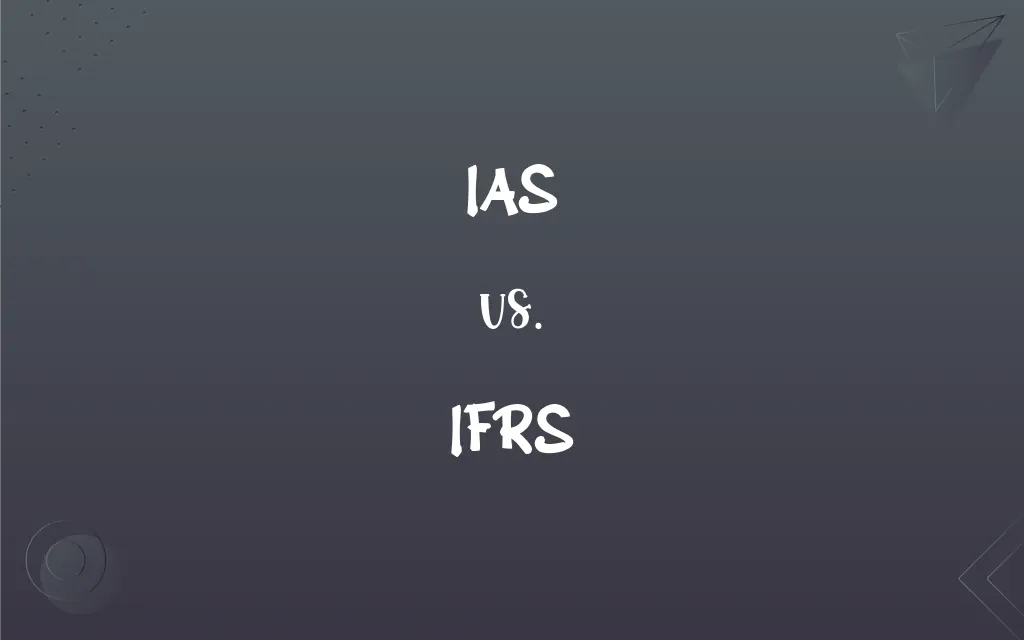IAS vs. IFRS: What's the Difference?
Edited by Aimie Carlson || By Janet White || Published on April 29, 2024
IAS (International Accounting Standards) are older global accounting standards, while IFRS (International Financial Reporting Standards) are the updated standards replacing IAS.

Key Differences
International Accounting Standards (IAS) were guidelines for financial reporting developed by the International Accounting Standards Committee (IASC) up until 2001. In contrast, the International Financial Reporting Standards (IFRS) are accounting standards issued by the International Accounting Standards Board (IASB) from 2001 onwards, replacing IAS.
IAS set out how particular types of transactions and other events should be reported in financial statements. However, IFRS standards are more comprehensive and provide guidance on a wider range of accounting activities, building on the foundations laid by the IAS.
IAS were the first international accounting standards, they were often considered less rigorous and lacked specificity in certain areas. IFRS, on the other hand, aim to provide more global consistency and are generally seen as more detailed and thorough than the IAS.
One of the key differences is that IAS was primarily a product of professional accounting bodies and interests, whereas IFRS are developed by an independent organization, the IASB. The IASB has a more diverse representation from multiple countries, enhancing the global applicability of IFRS.
IAS are still in use, but only for periods before the adoption of IFRS by the reporting entity. With the introduction of IFRS, the goal has been to establish a common global language for financial reporting, making it easier to compare and understand financial statements worldwide.
ADVERTISEMENT
Comparison Chart
Issuing Body
International Accounting Standards Committee (IASC).
International Accounting Standards Board (IASB).
Time Frame of Development
Developed until 2001.
Developed from 2001 onwards.
Scope and Detail
Less detailed, limited scope.
More detailed, broader scope.
Global Consistency
Considered less rigorous.
Aimed at greater global consistency.
Current Relevance
Used for periods before IFRS adoption.
Current standards for financial reporting.
ADVERTISEMENT
IAS and IFRS Definitions
IAS
IAS remain relevant for understanding historical financial reports.
Analysts refer to IAS for evaluating past financial performance.
IFRS
IFRS are continuously updated to reflect changing market conditions.
The company keeps abreast of the latest IFRS updates for compliance.
IAS
IAS aimed to standardize accounting across borders.
IAS helped the company align its reporting with international practices.
IFRS
IFRS aim for uniformity and transparency in financial reporting.
Adopting IFRS improved the clarity of our financial disclosures.
IAS
IAS are historical accounting standards issued by the IASC.
The company prepared its financial statements according to IAS until 2001.
IFRS
IFRS facilitate comparison of financial statements globally.
With IFRS, comparing our financials with international peers is easier.
IAS
IAS were replaced by IFRS for more comprehensive standards.
Post-2001, the company transitioned from IAS to IFRS.
IFRS
IFRS are the current global accounting standards issued by the IASB.
Our financial statements are now prepared in accordance with IFRS.
IAS
IAS provided guidelines for financial reporting.
Under IAS, the company reported its foreign exchange transactions.
IFRS
IFRS cover a broader range of accounting issues than IAS.
IFRS provide more detailed guidance on revenue recognition.
FAQs
When were IAS introduced?
IAS were introduced starting in 1973.
What does IAS stand for?
International Accounting Standards.
Who issues IFRS?
The International Accounting Standards Board (IASB).
What does IFRS stand for?
International Financial Reporting Standards.
Are IFRS more detailed than IAS?
Yes, IFRS are generally more detailed.
Do IFRS have global acceptance?
Yes, many countries have adopted or converge with IFRS.
How do IFRS benefit investors?
By improving comparability and transparency of financial statements.
Who developed IAS?
The International Accounting Standards Committee (IASC).
Do IFRS require more disclosures than IAS?
Generally, yes, for enhanced transparency.
Where can I find the text of IAS and IFRS?
On the IASB's website and through professional accounting bodies.
Can IFRS be applied to small companies?
Yes, though there's a simplified version called IFRS for SMEs.
When did IFRS start to replace IAS?
From 2001 onwards.
Can companies still use IAS?
Only for periods before their adoption of IFRS.
What's a major goal of IFRS?
To create a global standard for financial reporting.
Do IAS and IFRS affect tax reporting?
They influence financial reporting, which can impact tax calculations.
How often are IFRS updated?
Regularly, to respond to changes in the global market.
Is training required to switch from IAS to IFRS?
Yes, proper training is essential for accurate implementation.
Do IAS and IFRS differ in their treatment of assets?
Yes, there are differences in asset recognition and valuation.
Has the USA fully adopted IFRS?
No, the USA primarily uses GAAP, but there's some convergence.
Are IFRS mandatory in the European Union?
Yes, for consolidated financial statements of listed companies.
About Author
Written by
Janet WhiteJanet White has been an esteemed writer and blogger for Difference Wiki. Holding a Master's degree in Science and Medical Journalism from the prestigious Boston University, she has consistently demonstrated her expertise and passion for her field. When she's not immersed in her work, Janet relishes her time exercising, delving into a good book, and cherishing moments with friends and family.
Edited by
Aimie CarlsonAimie Carlson, holding a master's degree in English literature, is a fervent English language enthusiast. She lends her writing talents to Difference Wiki, a prominent website that specializes in comparisons, offering readers insightful analyses that both captivate and inform.






































































